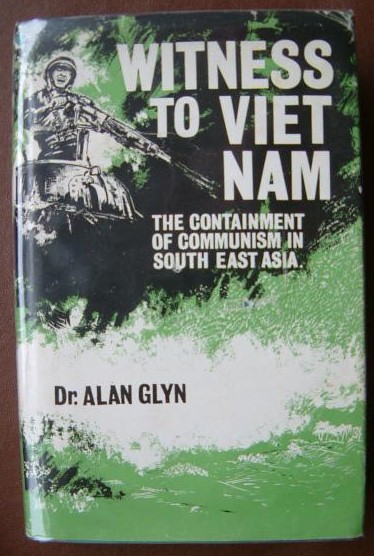Alan Glyn, Witness to Viet Nam: The Containment of Communism in South East Asia (1968)
Amidst the long history of controversy surrounding Australia’s involvement in the Vietnam War, and particularly the criticism levelled by those who interpret our commitment as an act of subservience to the United States, a more positive or at least noteworthy significance is often lost. That is that going to war in defence of South Vietnam was the first time that Australia joined a significant conflict completely independently of Great Britain, which stayed out of Vietnam entirely.
On 3 September 1939, Prime Minister Robert Menzies had famously announced Australia’s entry into World War II by declaring that Australia was at war ‘as a result’ of Britain being at war. Yet 26 years later the same leader broke new ground in establishing that Australian and British foreign policy could be fundamentally separate on the most important of issues. Reflecting an acceptance of the division of the Crown, which Menzies had once argued could not be both at war and at peace simultaneously.
So unprecedented was the move that the Royal Australian Navy had to design a new ensign to fly off the back of their ships, because ever since its inception in 1911 the RAN had simply flown the St George Cross White Ensign which the British Royal Navy had adopted in 1864. The problem was that if the RAN continued to fly this same flag in Vietnam, they might give the mistaken impression that Britain itself was involved in the conflict. Hence on 21 January 1966, the day after Menzies had announced his retirement but before he had formally left office, the Naval Board recommended to his government the adoption of a distinctly Australian ensign, which was to be ‘a white flag with the Union Flag in the upper canton at the hoist with six blue stars positioned as in the Australian flag.’ When this change was approved, the Naval Board explained to the public:
‘We are all proud to have served under the White Ensign but it is now appropriate that an unmistakable indication of the RAN’s position as an independent service of an independent nation of the British Commonwealth should be displayed in Her Majesty’s Australian ships and establishments.’
Britain’s absence from Vietnam reflected its by now sharply distinct strategic priorities, as it prepared to finally withdraw all of its forces East of Suez. Whereas for Australia Vietnam was seen as a conflict resolutely in our own backyard, in which defeat by the forces of global communism might ultimately precipitate a direct threat to the Australian mainland. However, just because Britain opted to stay out of the war, does not mean that there weren’t prominent voices in British politics propagating the merits of Western intervention in the conflict.
One such voice was Dr Alan Glyn, the well-travelled former Conservative Member for Clapham. Glyn had developed a fascination with all things Asia since he was taught at Cambridge by a renowned historian of Chinese science named John Needham, and when he enlisted in World War II he made a point of volunteering to serve in the ‘Far East’. Glyn was equally a passionate anti-communist, whose views on the threat posed by that ideology had crystallised when he happened to be in Hungary for the vicious Soviet invasion of 1956, which convinced him that the only thing stopping the massive horde of Soviet troops he witnessed from marching their full way across Europe was the threat of nuclear retaliation.
Having lost his marginal seat amidst a widespread swing to Labour at the 1964 election which brought Harold Wilson to power, Glyn used his newfound free time to return to Asia and conduct research for what became Witness to Viet Nam. A book which reflected both a partisan defence of the South Vietnamese position, and a more nuanced understanding that the conflict could not be won by force alone. As he explained in a BBC interview, victory would require providing ‘three essential things for the people of Vietnam’:
‘First of all, you have got to give them security from attack by the Vietcong; secondly, you have got to be able to produce a better standard of living than that which is offered by the Communists; and lastly you have got to give them the feeling that they can go about their business, tend their fields, in liberty and freedom, and live a normal family life not any different from any other community in the world.’
While Menzies was out of office by the time of the book’s publication and clearly needed no convincing of the merits of intervention, he knew Glyn from meetings of the ‘Compatriots Club’ comprised of Conservative MPs, and took a keen interest in his newest publication, which made sure to cover the exploits of the Australian task force Menzies had committed. Telling Glyn in a short letter that he was ‘reading it with more than common interest’.
You might also like...
Sign up to our newsletter
Sign up for our monthly newsletter to hear the latest news and receive information about upcoming events.


